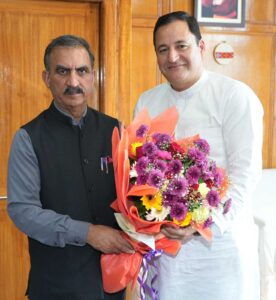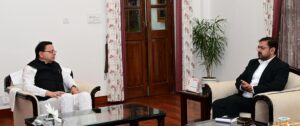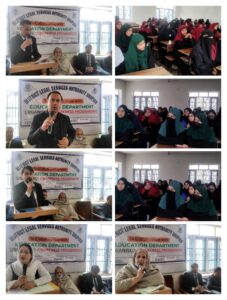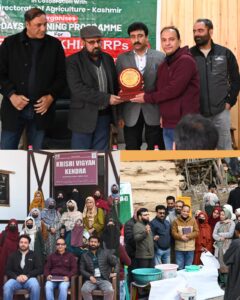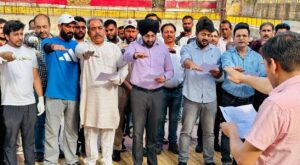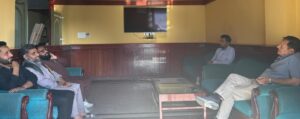J&K CM chairs first meet with civil society members in Jammu
Jammu, Dec 11 (PTI) Jammu and Kashmir Chief Minister Omar Abdullah on Wednesday chaired a meeting of civil society members at his official residence here, his first such exercise in Jammu after the National Conference-led government assumed power in the Union Territory.
Abdullah reiterated that his government represents all citizens of J&K, regardless of their political affiliations.
Deputy Chief Minister Surinder Choudhary, and ministers Sakina Itoo, Javed Rana and Satish Sharma, chief minister’s advisor Nasir Aslam Wani and senior civil and police officers attended the over three-hour-long meet, officials said.
The meeting was part of the public outreach programme of the chief minister to ensure redressal of the issues faced by different sections of the society, including business community, lawyers and tourism stakeholders.
The representatives attending the meeting raised their problems and sought immediate intervention of the government in addressing these issues concerning their welfare, the officials said.
The chief minister heard the participants patiently and assured that all their issues will be addressed in due course of time, they added.
A similar interaction was held on October 30 with civil society representatives in Kashmir.
Addressing concerns of regional bias, the chief minister said “this government is not just for those who voted for the National Conference; it is the government of every citizen of Jammu and Kashmir”.
“Despite attempts by some to play with emotions of Jammu after the elections and harping on issue of regional divide, we have consistently prioritized inclusivity and equity,” Abdullah said.
The chief minister highlighted his deliberate decision to appoint a deputy CM from Jammu, not out of compulsion but to underscore that Jammu is as integral to this government as Kashmir.
Out of 43 assembly seats in Jammu, the BJP has won 29 seats and emerged as the second largest party after National Conference.
The event brought together a diverse group of stakeholders, including representatives of women’s organizations, non-governmental organizations, ex-servicemen, Kashmiri Pandits, traders, hoteliers, tourism players, transport associations, religious leaders, pensioners, senior folk singers, Sikh representatives, RTI activists, and leaders from various political parties.
The chief minister expressed concern over Jammu’s limited share of the burgeoning tourism industry and laid out plans to diversify the region’s economy.
“Over one crore pilgrims visit Mata Vaishno Devi shrine annually, but we have yet to tap into even 15 per cent of this potential to promote tourism in Jammu. If we can redirect a fraction of these pilgrims, Jammu’s economy can transform,” he noted.
He announced plans to establish a craft and culture fair modelled on the Surajkund Mela, to showcase the region’s rich heritage and boost tourism.
“The initiative will involve collaboration between industries, farmers, cultural representatives, and tourism stakeholders,” he said.
Abdullah highlighted several key issues raised during the interaction and outlined his government’s commitment to addressing them.
He said that smart city projects are nearing completion and there is no scope for this government to do “any course correction but we shall take new initiatives” for Jammu and Srinagar, which aim to modernize the city’s infrastructure and enhance its livability.
The government, he said, will resolve the shortage of Punjabi teachers in schools catering to Sikh children and address some of their genuine concerns.
Acknowledging the challenges faced by the Kashmiri migrant Pandits, the chief minister said, “While their return depends on restoring a sense of security among the community, we are committed to improving their living conditions and addressing their grievances.”
He emphasized the need for regular dialogue with civil society to maintain a pulse on ground realities.
Unlike in the past, when such meetings were convened only during crises, he committed to holding biannual interactions — twice each in both the regions of Jammu and Kashmir.
“Our goal is to maintain a continuous dialogue with you. By our next meeting, we will present an action-taken report outlining the progress on issues discussed today,” he assured.
Abdullah thanked the participants for accepting his invitation, emphasizing the significance of such meetings for the government authorities to receive valuable feedback from outside four walls of their offices.
“Whether you benefit from these meetings or not, my colleagues and I certainly do. These interactions provide us with an opportunity to hear your thoughts on our work and governance directly,” he said.
In his closing remarks, Abdullah expressed gratitude to the participants for their valuable insights and suggestions.
“Your feedback and ground realities help us improve our governance. I hope that when we meet again, you will continue to provide your constructive input to guide us in serving Jammu and Kashmir better,” he said.
The civil society members hailed the initiative and termed it as a step towards transparent and inclusive governance. They said the much needed interaction has set the tone for fostering stronger ties between the government and the people it serves.

